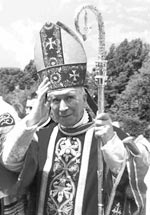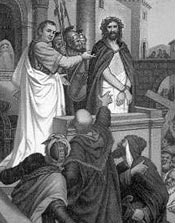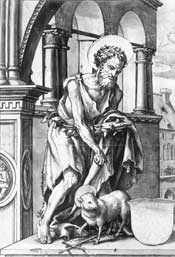|
|
The mystery of Jesus Christ is so profound, so extraordinary, that it would seem more natural to adore Him in silence than to speak of Him. For we must rightly fear that our words, like our thoughts, are vastly inadequate to express all of the riches contained in the ineffable sanctuary, which Jesus Christ is. St. Paul certainly thinks so: "orantes simul et pro nobis ut Deus aperiat nobis ostium sermonis ad loquendum mysterium Christi... ut manifestem illud ita ut oportet me loqui. - Praying withal for us also, that God may open unto us a door of speech to speak the Mystery of Christ... that I may make it manifest as I ought to speak" (Col 4:3-4). St. Paul's descriptions of Our Lord are marvelous, and incite us to make of Jesus Christ our life-"mihi vivere Christus est - for to me, to live is Christ" (Phil 1:21) - and always to become more Christian: "Qui est imago Dei invisibilis, primogellitus omnis creaturae, quoniam in Ipso condita sunt Universa in caelis et in terra visibilia et invisibilia, sive Throni, sive Dominationes, sive Principatus, sive Potestates. Omnia per Ipsum et in Ipso creata sunt. Ipse est ante omnes et omnia in Ipso constant - Who is the image of the invisible God, the first born of every creature; for in Him were all things created in Heaven, and on earth, visible and invisible, whether thrones, or dominations, or principalities, or powers; all things were created by Him, and in Him; and He is before all, and by Him all things consist." (Col 1:15-17) The presence of the Incarnate God in the history of humanity cannot but be its center, as a sun, towards which everyone goes, and from which everything comes. And if one thinks and believes that this mystery of the Incarnation is for the mystery of the Redemption, then it goes without saying that without Jesus Christ, there can be no salvation possible. Every act and every thought, which are not Christian, are without saving value, without merit for salvation. To try to place this mystery, we will reproduce a beautiful page of Father Pegues in his catechism of St. Thomas Aquinas, where he begins the tertia pars of the Summa Theologica, which puts us in contact with the mystery of Jesus Christ or man's path of return to God: What do you understand by the mystery of Jesus Christ - that is, of the Word made flesh?
I understand the fact, absolutely incomprehensible for us on this earth, that the Second Person of the Most Holy Trinity, the Word, the only Son of God, Who being from all eternity with His Father and the Holy Ghost the same One and Only True God, by Whom all things were created, and who governs them as Sovereign Master, came upon earth in time by His Incarnation in the bosom of the Virgin Mary of whom He was born. He lived our mortal life, preached the Gospel to the Jewish people of Palestine to whom He was personally sent by His Father, was repudiated by this people, taken and surrendered to the Roman Governor Pontius Pilate, condemned and put to death on the cross, was buried, descended into Hell, rose from the dead on the third day, ascended into Heaven forty days after, sits at the right hand of God the Father, from whence He governs His Church, established by Him on earth, to which He sent His Spirit, which is also the Spirit of the Father, sanctifying this Church by the Sacraments of His grace, thus preparing it for His Second Coming at the end of time, when He will judge the living and the dead, having made them come out of their tombs to establish the final separation of the good from the evil, that He might take the good with Him to the kingdom of His Father where He will anchor them in eternal life, and that He might chase away the wicked, accursed by Him, and condemned to the torture of everlasting fire. This brief dogmatic and historic survey of the mystery of the Incarnation of Our Lord Jesus Christ enlightens us somewhat on the gifts and privileges of God Incarnate, and the consequences, which proceed from the Incarnation for all of humanity and for every man taken individually. For all are profoundly affected by the coming of God among them and thus the future, for eternity will depend hence-forward on their relationship with Jesus Christ, whether they be conscious of it or not, whether they wish it or not. We could never meditate enough on the riches of the treasure, which is Jesus Christ. "Si scires donum Dei - if thou didst know the gift of God" (Jn 4:10), said Jesus to the Samaritan. "There hath stood one in the midst of you," said St. John the Baptist, "whom you know not... the latchet of whose shoe I am not worthy to loose" (Jn 1:26-27). God the Father and God the Holy Ghost manifest themselves that we might discover the mystery of Jesus: "And forthwith coming up out of the water, he saw the heavens opened, and the Spirit as a dove descending, and remaining on Him. And there came a voice from heaven: Thou art My beloved Son; in Thee I am well pleased" (Mk 1:10-11) "I saw the Spirit coming down, as a dove from heaven, and He remained upon Him. And I knew Him not; but He who sent me to baptize with water said to me: He upon whom thou shalt see the Spirit descending, and remaining upon Him, He it is that baptizeth with the Holy Ghost. And I saw, and I gave testimony, that this is the Son of God" (Jn 1:32-34). Everything, which followed confirmed this judgment of John the Baptist. From the Annunciation of the angel to Mary on, all events concerning Him had shown this to be true. Jesus is indeed the Emmanuel-God among us. If this man is God, what an abundance of gifts must fill His soul and His body! God's own taking to Himself a soul and a body confers on this man unique attributes, rights, gifts, and privileges, which surpass all that we can imagine. Let us draw near this divine sanctuary so as to better appreciate Him and adore Him more perfectly and more profoundly, and so as to consecrate ourselves, with enthusiasm and without limit, in His service. How can we not feel called, like the apostles who immediately abandoned everything to follow Him? Three particular
graces adorn the body of Jesus, from the moment of His conception
in the womb of the Virgin Mary, and from the very infusion of the
soul into the body, which had been prepared for Him.
The first grace, which is also the source of the other two, is unique in all of creation. By His eternal decision to unite to His Person a soul and a body, God the Word communicated to these creatures in an ineffable and mysterious manner His own divinity in all abundance, inasmuch as these creatures, by the divine will, were capable of receiving it. It is spoken of as the Hypostatic Union, which conferred upon this soul and this body a divine dignity. All of the acts of this soul and this body are consequently divine, and are justly attributed to God, Who assumes the responsibility for every activity of this soul and this body. By its very nature, and necessarily, this grace of union conferred upon this Person living in this human nature, some unique titles: Mediator, Savior, Priest and King. All mediation, all priesthood, all royalty among creatures is by participation in these properties which are the natural and proper jewels of Our Lord Jesus Christ. How, then, can we not be convinced of the sublimity of our priesthood, which is a participation in the grace of union which is proper to Our Lord? It is, in effect, by His Priesthood that Our Lord exercises His mediation, His role as Savior; and the essential act of His Priesthood, His Sacrifice on Calvary, by which He merited for us all the graces of salvation. The Cross appears already’ by this grace of union, as the sign of the immolation of His divine body and the oblation of His holy soul to His Father, a supremely efficacious prayer. This is the essence of the heritage, which He bequeathed to the Church: His Eucharistic and propitiatory Sacrifice continued on the altars by those who are chosen to share in His unique priesthood. Would that the seminarians, priests and bishops, find the meaning of their priesthood in these few fundamental truths on the grace of union in Our Lord. Would that they might perceive for its true worth the sublimeness of the heritage, which is bequeathed to them, of the Holy Sacrifice of the Mass, which ought to be the source of their sanctification as of their apostolate. Our Lord's act of sacrifice being the act which constitutes the Sacrament of the Eucharist, the life of Christ, Priest and Victim, must be the basis of their interior life and also the basis of their ministry: the giving of Jesus to souls. This indissoluble union of the Sacrifice and the Sacrament, which the Word Incarnate in His wisdom willed, is precisely that which the Protestants reject and that which the innovators of Vatican II have practically made disappear by ecumenism! The grace of union confers on Our Lord's body and soul a sanctifying grace, which is quite unique in the world. It is so abundant that it becomes the source of all sanctifying grace, which is but the communication of the Holy Ghost, the Spirit of Charity of Our Lord "de Quo nos omnes accepimus - of His fullness we have all received" (Jn 1: 16). This sanctifying grace produces in Our Lord's body and soul marvelous effects. His soul, as soon as it came into being, received the Beatific Vision. He enjoyed this vision in His soul right throughout His existence and even on the Cross. It is indeed a great mystery that His soul was at the same time inundated with the most perfect bliss and flooded with pain and sorrow! Since He had in His soul the Beatific Vision, Our Lord could only have the theological virtue of charity, but not faith and hope, which disappear in the Beatific Vision. It is difficult to fully appreciate the profoundness and riches of the charity of Jesus' soul. It is quite clear that this grace, which was created although of ineffable perfection, cannot be compared to the infinite source of charity from whence it proceeded, which is none other than the divine Life of Jesus in the bosom of the Trinity. This sanctifying grace, unique in its riches, filled up the soul of Jesus with the virtues, gifts, beatitudes and fruits of the Holy Ghost. To this grace gratum faciens, source of the sanctity of Jesus' soul and body, were added as well all the graces gratis datae, or extraordinary graces. By these latter Jesus was able to accomplish His unique role of Savior, Sanctifier, Glorifier: graces of healing, miracles, marvels, of diversity of languages, of interpretation of speech, and especially of prophecy. Jesus being the Prophet by His divine and human nature, no other prophet was to follow Him. The apostles were not prophets, but instruments of the Prophet, to constitute by Tradition and Scripture, the deposit of the Faith, which was closed at the death of the last of the apostles. The successors of the apostles simply have to faithfully and exactly transmit the truths contained in this deposit. The prophetic period thus gave place to the dogmatic period, during which the popes and bishops have the charge of conserving and transmitting the deposit without alteration in eodem sensu et eadem sententia, until the end of time. Thus appears as of capital importance the true notion of Jesus Prophet. Jesus' body also possessed marvelous gifts of performing miracles. It should have been glorious, as a fruit of the Beatific Vision. But it is by an additional miracle that Jesus did not manifest the glory of His body, except on the day of His Transfiguration and of His Resurrection. The entire Gospel manifests the power of the body of Jesus. Even in the sepulchre, the incorruptible body of Jesus remained united to the Word, Who returned His soul to it and caused it to rise from the dead. Jesus' grace is such a unique and abundant source of salvation that it justly carries a name, which is proper to Our Lord: Gratia Capitis, the grace of the leader, or of the head. This signifies quite clearly that it is to Jesus Christ alone, to the Son of God Incarnate, that all in the work of salvation and all that is ordered towards supernatural good must ultimately be related to and return to. "Non est in alio aliquo salus; there is no salvation outside of Our Lord." It is based on this principle of the capital grace of Our Lord that those who work to save souls must found their actions. Anything that can be done without any regard at all for Our Lord, either directly or indirectly, is vain and is in no way profitable for eternal salvation. This must be a directing principle of our pastoral activity. We must strive to supernaturalize everything, by prayer and charity, refusing to involve in our activities too many participants who manifest their opposition to any religious and Christian act. But it is another thing to accept those who have good dispositions, but are ignorant and can convert to Our Lord. Since everything in God's plan is ordered to the salvation of souls by Jesus Christ, and by Him alone, we are to encourage in every domain, social, political, economical, familial, those who strive to attach their actions to the law of Our Lord, both natural and supernatural. For Our Lord rules all: His law should be that of all nations, and of all men without exception.
Home | Contact
| Mass Centres | Schools
| Pilgrimages | Retreats
|
Precious Blood Residence |
||||||||||||||||||




